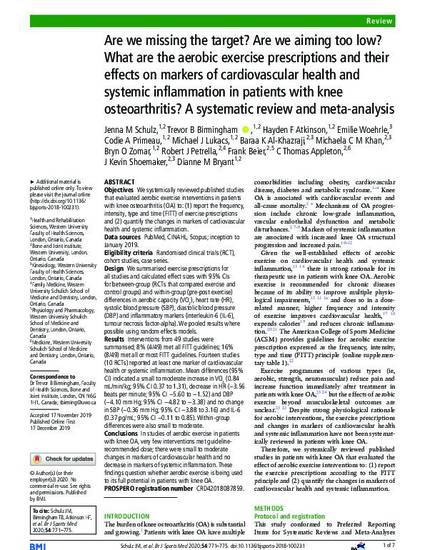
© Author(s) (or their employer(s)) 2020. No commercial re-use. See rights and permissions. Published by BMJ. Objectives We systemically reviewed published studies that evaluated aerobic exercise interventions in patients with knee osteoarthritis (OA) to: (1) report the frequency, intensity, type and time (FITT) of exercise prescriptions and (2) quantify the changes in markers of cardiovascular health and systemic inflammation. Data sources PubMed, CINAHL, Scopus; inception to January 2019. Eligibility criteria Randomised clinical trials (RCT), cohort studies, case series. Design We summarised exercise prescriptions for all studies and calculated effect sizes with 95% CIs for between-group (RCTs that compared exercise and control groups) and within-group (pre-post exercise) differences in aerobic capacity (VO 2), heart rate (HR), systolic blood pressure (SBP), diastolic blood pressure (DBP) and inflammatory markers (interleukin-6 (IL-6), tumour necrosis factor-alpha). We pooled results where possible using random effects models. Results Interventions from 49 studies were summarised; 8% (4/49) met all FITT guidelines; 16% (8/49) met all or most FITT guidelines. Fourteen studies (10 RCTs) reported at least one marker of cardiovascular health or systemic inflammation. Mean differences (95% CI) indicated a small to moderate increase in VO 2 (0.84 mL/min/kg; 95% CI 0.37 to 1.31), decrease in HR (-3.56 beats per minute; 95% CI -5.60 to -1.52) and DBP (-4.10 mm Hg; 95% CI -4.82 to -3.38) and no change in SBP (-0.36 mm Hg; 95% CI -3.88 to 3.16) and IL-6 (0.37 pg/mL; 95% CI -0.11 to 0.85). Within-group differences were also small to moderate. Conclusions In studies of aerobic exercise in patients with knee OA, very few interventions met guideline-recommended dose; there were small to moderate changes in markers of cardiovascular health and no decrease in markers of systemic inflammation. These findings question whether aerobic exercise is being used to its full potential in patients with knee OA. PROSPERO registration number CRD42018087859.
Available at: http://works.bepress.com/frank-beier/6/
